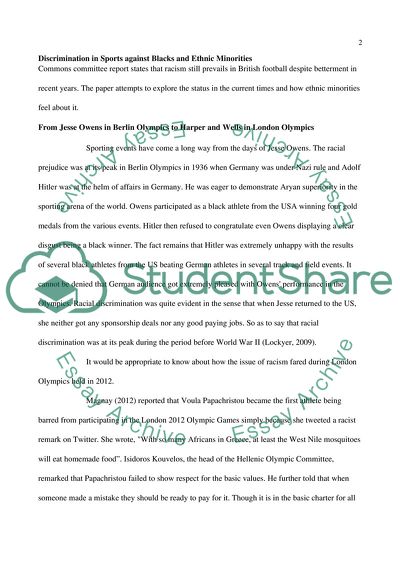Cite this document
(Discrimination in Sports Against Blacks and Ethnic Minorities Coursework, n.d.)
Discrimination in Sports Against Blacks and Ethnic Minorities Coursework. https://studentshare.org/sports-and-recreation/1791593-while-recognising-the-progress-that-has-been-made-it-is-still-the-case-that-inequalities-and-discrimination-continue-to-structure-the-reality-of-sport-for-blacks-and-ethnic-minorities-carrington-and-mcdonald-2008
Discrimination in Sports Against Blacks and Ethnic Minorities Coursework. https://studentshare.org/sports-and-recreation/1791593-while-recognising-the-progress-that-has-been-made-it-is-still-the-case-that-inequalities-and-discrimination-continue-to-structure-the-reality-of-sport-for-blacks-and-ethnic-minorities-carrington-and-mcdonald-2008
(Discrimination in Sports Against Blacks and Ethnic Minorities Coursework)
Discrimination in Sports Against Blacks and Ethnic Minorities Coursework. https://studentshare.org/sports-and-recreation/1791593-while-recognising-the-progress-that-has-been-made-it-is-still-the-case-that-inequalities-and-discrimination-continue-to-structure-the-reality-of-sport-for-blacks-and-ethnic-minorities-carrington-and-mcdonald-2008.
Discrimination in Sports Against Blacks and Ethnic Minorities Coursework. https://studentshare.org/sports-and-recreation/1791593-while-recognising-the-progress-that-has-been-made-it-is-still-the-case-that-inequalities-and-discrimination-continue-to-structure-the-reality-of-sport-for-blacks-and-ethnic-minorities-carrington-and-mcdonald-2008.
“Discrimination in Sports Against Blacks and Ethnic Minorities Coursework”. https://studentshare.org/sports-and-recreation/1791593-while-recognising-the-progress-that-has-been-made-it-is-still-the-case-that-inequalities-and-discrimination-continue-to-structure-the-reality-of-sport-for-blacks-and-ethnic-minorities-carrington-and-mcdonald-2008.


